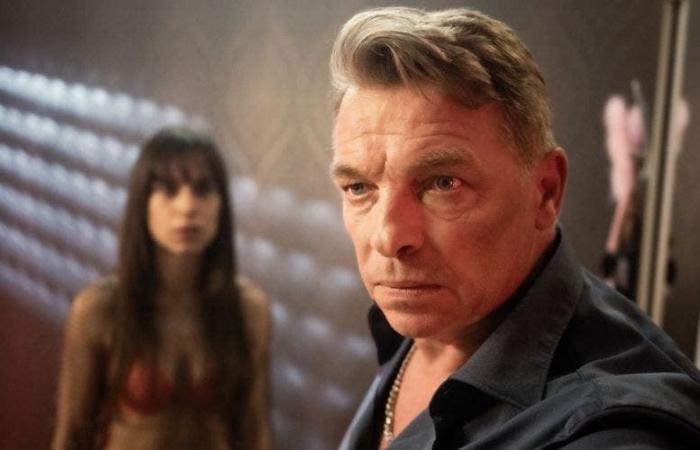In “Seventh Floor”, the new “crime scene” from Cologne, the victim has become widely unpopular and the circle of suspects is large. But the film is more interested in the milieu than the murderer.
Cosima Adam is an employee of Eroscenter managing director Gerald Kneissler – and is suspected of murder.
Martin Valentin Menke / WDR
There is a dead person lying in front of a high-rise building. There is a window open seven floors up. It was murder and not suicide, that is clear to the Cologne police. The victim, Malik Zeman (Mehdi Salim), worked as a building technician in the Eroscenter, and thus the new “crime scene” has found its setting. The possible perpetrators are the women of the house – three sex workers (Jasmin Backes, Maddy Forst, Senita Huskić), a nail salon owner (Sabrina Setlur) and a hairdresser (Nuriye Jendrossek).
But actually it could have been anyone who knew Malik. Because he was universally hated, and “God was probably having a bad day when his parents made him,” as one of the suspects explains. A few video clips that the building technician posts in a buddy chat group portray him as an aggressive misogynist and lover of the lowest levels of language. Overall, the new “crime scene” is not recommended for fans of sophisticated word choice. He also quickly eliminates any possible sympathies for the victim.
Meanwhile, inspectors Ballauf (Klaus J. Behrendt) and Schenk (Dietmar Bär) are looking for the perpetrators. Basically, the murder case is used as an excuse to take a closer look around the red light district. The film is also really close, because a large part of it was filmed in a Cologne Eroscenter, while operations continued on the lower floors and the punters ran into the “Tatort” team in the elevator and in the corridors.
Talking heads
At some point, the main female characters reveal their life stories by looking directly into the camera, thereby breaking the so-called “fourth wall” of cinematic storytelling. They look and speak to us directly – we, the viewers, are meant. This rarely used stylistic device is reminiscent of classic shots in documentaries and television discussions with their “talking heads” in close-up.
This “crime scene” would ideally be a documentary itself: advancing a story becomes a minor matter. He would much rather focus on the environment and the peculiarities of the “oldest trade in the world”, which is also one of the oldest themes in cinema history. Traditionally, films still have a reputation for being extraordinary, obscene or immoral – and almost always have something to do with crime.
That’s how it is here too. The parallel world of the red light district is viewed with disgust, but also with a certain fascination: the women in the Laufhaus are either beautiful or charismatic. In any case, the film and the sympathy of those who made it (director: Hüseyin Tabak) and, according to press reports, researched it for a long time (screenplay: Eva Zahn, Volker A. Zahn) belong to them.
Big lies
The film passionately takes sides with prostitutes. They are portrayed as suffering greatly from their work. You could also say: as a victim. Some as victims of the violence of others, others damaged by their own illusions. The statement character of “Seventh Floor” is a problem. He exaggerates – and goes to the point of embarrassment.
One of the women speaks into the camera: “If I want an apartment, then I have to lie. When I go to school with my sons, I have to lie. . . I lie to my body so that it can endure. I lie to my soul so I don’t cry all the time. I lie to the men who are above and within me.” Then you already understand it. But she gets to the finale: “It’s not my vagina that hurts, it’s the lie.” So you know everything you need to know about this “crime scene”.
“Tatort” from Cologne: “Seventh Floor”. Sunday, 8:05 p.m./8:15 p.m., SRF 1 / ARD.






